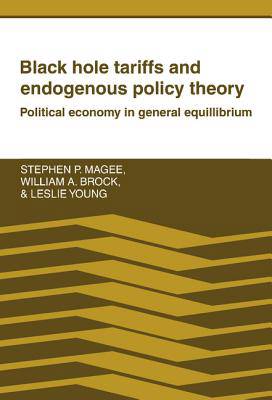
Je cadeautjes zeker op tijd in huis hebben voor de feestdagen? Kom langs in onze winkels en vind het perfecte geschenk!
- Afhalen na 1 uur in een winkel met voorraad
- Gratis thuislevering in België vanaf € 30
- Ruim aanbod met 7 miljoen producten
Je cadeautjes zeker op tijd in huis hebben voor de feestdagen? Kom langs in onze winkels en vind het perfecte geschenk!
- Afhalen na 1 uur in een winkel met voorraad
- Gratis thuislevering in België vanaf € 30
- Ruim aanbod met 7 miljoen producten
Zoeken
Black Hole Tariffs and Endogenous Policy Theory
Political Economy in General Equilibrium
Stephen P Magee, William A Brock, Leslie Young
Hardcover | Engels
€ 245,45
+ 490 punten
Omschrijving
This book provides a special interest theory of protection, developing a full general equilibrium theory that explains the distribution of income with goods markets, factor markets, lobbies, political parties, and voters all pursuing their self interest. This probabilistic voting model shows how well-organized groups can use seemingly irrational government policies to exploit poorly organized groups. Given rational predatory behavior between these groups, protection or any other redistributive policy that improves the chances of election of a party increases political efficiency. This can create an economic black hole, conditions under which an entire economy can disappear into lobbying. Paradoxically, the tariff rates accompanying an economic black hole are very low. The economic waste is confined to lobbying costs. The book contains both theoretical and empirical work explaining protection in the United States (1900-1988) and levels of protection in about sixty foreign countries in the 1980s.
Specificaties
Betrokkenen
- Auteur(s):
- Uitgeverij:
Inhoud
- Aantal bladzijden:
- 460
- Taal:
- Engels
Eigenschappen
- Productcode (EAN):
- 9780521362474
- Verschijningsdatum:
- 25/08/1989
- Uitvoering:
- Hardcover
- Formaat:
- Genaaid
- Afmetingen:
- 155 mm x 231 mm
- Gewicht:
- 725 g

Alleen bij Standaard Boekhandel
+ 490 punten op je klantenkaart van Standaard Boekhandel
Beoordelingen
We publiceren alleen reviews die voldoen aan de voorwaarden voor reviews. Bekijk onze voorwaarden voor reviews.









